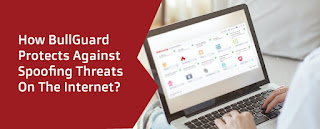How BullGuard protects against spoofing threats on the Internet?
Spoofing calls still exist offline and they target cell phone numbers but people have now forgotten such threats. Apart from online internet security danger, your personal stuff is not even secure offline. This all is because of spoofing calls but it is always recommended BullGuard always takes care of your privacy when it comes to protecting you against such calls.
Table Of Content:
- Spoofing Versus Phishing
- Common Spoofing Forms
- Protection against Spoofers: BullGuard
- Bottom Line-
Spoofing Versus Phishing
A common misconception about spoofing is that it is as same as phishing. In fact, there are two different kinds of internet security threats but they are tied to one another very strongly. Spoofing refers to the way through which cyber crooks trick the target by talking identity of a well-known trustworthy thing. Phishing, on the other hand, is the way to trick someone to give their private information like bank or social account details and credit/debit card details.
Common Spoofing Forms
URL Spoofing- In some internet security scams, cyber crooks reproduce trusted webpages and then send web address that looks like legitimate in scam emails to the web users or place on other sites. When the user clicks on it, they will be redirected to that site that is malicious which exploits vulnerabilities of a web browser.
Email Spoofing- The sender's signature and the address will appear as the email was sent by the company or person. To make the email look reliable, or legitimate, cybercrooks have spoofed email sender that is listed by names of renowned websites and banks like Amazon, Paypal, and eBay and continues to do so.
IP Spoofing- Hackers can get unauthorized access to PC networks by making the IP Address of the PC that looks like one of the trusted PC. This way they can conduct network attacks and look being conducted by another body.
Wi-Fi Spoofing- Some Wi-Fi hotspots can look as legitimate as the trusted companies, but they are set up by cyber-crooks who steal data that is sent or received by the users.
Spoofing files on File sharing app- Not all the files you receive on popular file-sharing platforms are trustworthy. Some of them might look like it is real with the name/author/title, but they might be fake and come with some type of malware.
Protection against Spoofers: BullGuard
BullGuard Internet Security comes in the light and it protects yourself and the device from the threats which are mentioned above.
Be suspicious of emails that ask for providing personal information and it doesn’t matter if the sender is trustworthy. Make sure that the bank will never ask for credit card information through email.
Facebook will never ask for such details including account credentials. If you get an email from them linking for their site, never click on the link that is provided. Open the respective site from a new window, to avoid accessing a fake one.
Never trust when it comes to the privacy of file-sharing platforms. It is best if you have your own security in place, effective security software offered by BullGuard Internet Security. The antivirus engine will keep your PC secured even from the advanced malware forms.
Always stay updated and keep yourself informed about the new phishing methods and for additional security, it is recommended to install the BullGuard Internet Security suite that comes with such features.
BullGuard Firewall is also effective as it will counter any network attacks on PC that are done by the hackers
Be careful with the public Wi-Fi hotspot and it is best when you aren’t shopping or making online transactions because you never know who is watching your transaction to steal the financial details
Bottom Line-
BullGuard Internet Security definitely will keep you secured all the time against such internet hacking and internet threats. You can keep everything secure against internet hackers and cybercriminals.




Comments